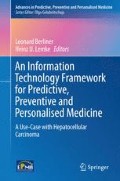Abstract
A wide variety of minimally invasive, or locoregional, therapies are now available for the treatment of hepatocellular carcinoma (HCC) along with surgery, systemic chemotherapy, and, occasionally, radiation therapy. These therapies are highly dependent on the strengths and limitations of the supporting technologies. This Chapter will review thermal ablation techniques including: radiofrequency ablation (RFA), interstitial laser thermotherapy (ILT), microwave ablation (MWA), high intensity focused ultrasound (HIFU), and cryotherapy (CRYO), and non-thermal ablations including: alcohol injection (ETOH), irreversible electroporation (IRE), and photodynamic therapy (PDT). Tumor ablation involves a focal destruction of tissue to achieve a therapeutic effect that may be an attempt at local cure of a tumor, or may be for debulking a tumor for symptomatic (i.e. pain) reasons. At this time, RFA has the largest clinical experience and will serve as the prototype for understanding the principles, mechanisms, and methods that have been developed for the treatment of HCC. Ablation is performed with a minimally invasive approach—the effect is delivered interstitially and intratumorally via a device placed percutaneously. Imaging plays a critical role in the targeting of the lesion, the protection of the surrounding anatomy, and, if possible, in the monitoring and control of the ablation process. The parameters used in the selection of thermal ablation device and the outcomes of their usage will eventually be a factored in generating Digital Patient Models (DPMs) to facilitate diagnosis, prognosis, and treatment selection, i.e. Model Guided Therapy (MGT) and Predictive, Preventive and Personalized Medicine (PPPM).
Paul Morrison is deceased.
Access this chapter
Tax calculation will be finalised at checkout
Purchases are for personal use only
Author information
Authors and Affiliations
Corresponding author
Editor information
Editors and Affiliations
Rights and permissions
Copyright information
© 2015 Springer International Publishing Switzerland
About this chapter
Cite this chapter
Morrison, P., van Sonnenberg, E. (2015). Minimally Invasive Therapies for Hepatocellular Cancer: Ablation Technologies. In: Berliner, L., Lemke, H. (eds) An Information Technology Framework for Predictive, Preventive and Personalised Medicine. Advances in Predictive, Preventive and Personalised Medicine, vol 8. Springer, Cham. https://doi.org/10.1007/978-3-319-12166-6_8
Download citation
DOI: https://doi.org/10.1007/978-3-319-12166-6_8
Published:
Publisher Name: Springer, Cham
Print ISBN: 978-3-319-12165-9
Online ISBN: 978-3-319-12166-6
eBook Packages: MedicineMedicine (R0)

